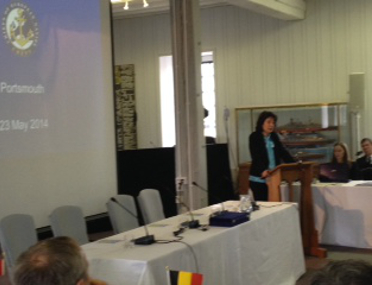European Maritime Security Strategy : Moving Forward

Commissioner Damanaki addressed the Chiefs of European Navies (CHENS) today in Portsmouth where they are holding their annual meeting. Read her speech below.
The CHENS is an informal, independent and non-political forum which brings together the Chief of Navy of each European maritime nation that is either a member of NATO or the EU and has naval armed forces. This event has been the opportunity for Commissioner Damanaki to come back on the proposal that she jointly tabled with High Representative Ashton early March for a European Maritime Security Strategy. Commissioner also recalled that ensuring the security and safety of our seas and oceans is a prime objective for the EU and that this proposal is an important step towards the completion of this objective.

CHENS annual meeting
Portsmouth, 23 May 2014
Key Note Speech by Maria Damanaki
European Maritime Security Strategy : Moving Forward
Gentlemen,
It is a pleasure to meet you all again here in the lovely city of Portsmouth.
If you recall, this time last year during your Annual Meeting in Athens, I was making the case for closer cooperation across the security players and arguing in favor of a Maritime Security Strategy for the European Union.
A year later we have a concrete proposal that is in fact being negotiated in the Council as we speak.
This is the proposal that the High Representative, Ms. Ashton, and I tabled in March: an embryo of a EU Maritime Security Strategy for the first time ever; a framework for national authorities and EU players to work much more closely than today on securing the global maritime domain and the EU sea basins.
The starting point for it is that the European Union is a global maritime power and a global maritime security provider. We have a responsibility to achieve rule-based governance of the seas and we can do that by working with our international partners, particularly NATO.
Cooperation is the name of the game here, as is complementarity.
The strategy is indeed based on the principles of coherence, cross-sector cooperation and cost efficiency.
Importantly, it will link up EU domestic policies with external ones, so as to enable military-civilian cooperation.
But let me be very clear: our proposal preserves the functional integrity of each sector and fosters cooperation without creating new structures.
Some of you have made the point that the text does not put enough emphasis on the role of the navies. But I believe that, as it stands, the proposal has much to offer to the navies. We all have something to gain from cross-sector cooperation.
Don’t get me wrong: each of you is already doing a great job. And Operation ATALANTA has shown that the EU naval force can accomplish a lot.
But this is no time to rest on our laurels; we have to keep going forward and tackle an ever more complex security climate. We have to find ways to save money and still be more prepared than ever. And that is the purpose of our initiative.
So your advantage will depend on your concrete input and involvement into the upcoming action plan. For instance:
What areas of cooperation with your civilian partners do you want to explore or deepen? Risk analysis and management? Ocean-going capacities?
Maintaining a naval frigate armed and ready for combat at all times is expensive by definition. But more and more nowadays coastguards use multi-purpose vessels.
Now I wonder: couldn’t these be shared or exchanged? Could patrols be coordinated?
Couldn’t time-consuming duties like procurement, risk analysis or maintenance support be successfully split?
Let us not forget that interoperability of radio communications would reduce technical costs. And that by pooling training capacities we can get properly trained personnel with less money.
Moreover a coordinated approach helps our case internationally, when we want to safeguard our common interests or plan activities or maritime exercises with third countries. Some third countries are already giving us ideas in this sense.
These are just a few examples, Gentlemen.
In reality, Cathy Ashton and I have identified over twenty actions that would clearly benefit from closer cooperation between EU countries and agencies - each recognizing that, given the climate we now operate in, we need to do more with less.
Any decision is ultimately up to you, of course, but I think all of these areas deserve careful consideration.
I am not denying that it is new territory: a new set up that will require a mind-set change. But I think the time is ripe.
And the response so far is positive. The European Council made maritime security a high political priority; our governments uphold the principle that we should firm up the EU's position as a global leader in sound maritime governance and are now at work to turn the proposal into a fully-fledged strategy that can be adopted by the General Affairs Council this June.
This is great news. This is transformative.
As for me, for the last four years I have been working to rekindle the maritime economy. But that goes hand in hand with security: no businessman will invest on a maritime activity if off-shore installations are not safe or trade routes are not secure.
That is the reason why I am also working on a Common Information Sharing Environment for the maritime domain that I believe will improve our situational awareness and our response capability.
To conclude, I am even more convinced than last year that today's risks and threats call for a coordinated response.
Our strategy will seek to make the best use of existing resources, promote effective and credible partnerships, be cost efficient and encourage our nations to work hand in hand. The role of European Navies will be key in that respect.
This is not only a responsibility which we cannot shirk but is also what the European Union model is all about.
Thank you.


